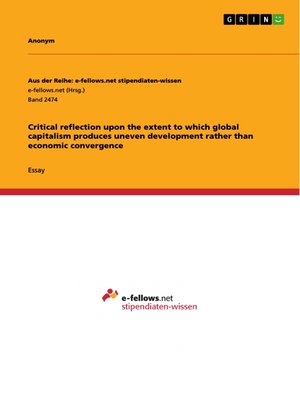Critical reflection upon the extent to which global capitalism produces uneven development rather than economic convergence
ebook ∣ Aus der Reihe: e-fellows.net stipendiaten-wissen

Sign up to save your library
With an OverDrive account, you can save your favorite libraries for at-a-glance information about availability. Find out more about OverDrive accounts.
Find this title in Libby, the library reading app by OverDrive.



Search for a digital library with this title
Title found at these libraries:
| Library Name | Distance |
|---|---|
| Loading... |
Essay from the year 2017 in the subject Geography / Earth Science - Economic Geography, grade: 1,7, University of Cologne, language: English, abstract: "Just 8 men own same wealth as half the world" - With this title Oxfam published its annual study on global inequality in January this year. Even if the exact calculation of their numbers is controversial, the report itself is shocking. In answer to this news the scientific debate about global inequalities as well as economic convergences, which emerge within the structures and processes of our global capitalism, break out again. The Nobel laureate Joseph Stiglitz, for example, blames
global capitalism for this development and sends an appeal for strengthened corporate social responsibility. In this essay I therefore want to examine to which extent global capitalism can be seen as the producer of uneven development rather than of economic convergence. Since the early 1980s the winds of global capitalism became stronger. It was a period where developing countries with their mostly inward-looking and nationalistic policies suffered deep crisis like the Latin American depth crisis as of the early 1980s or the collapse of the Soviet Bloc in 1991. During this era neoliberal economies of the more developed world built the hegemonic power [...]







